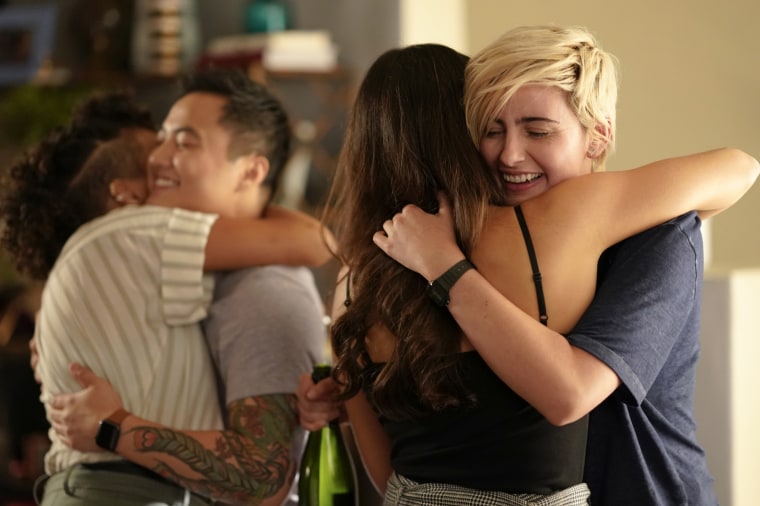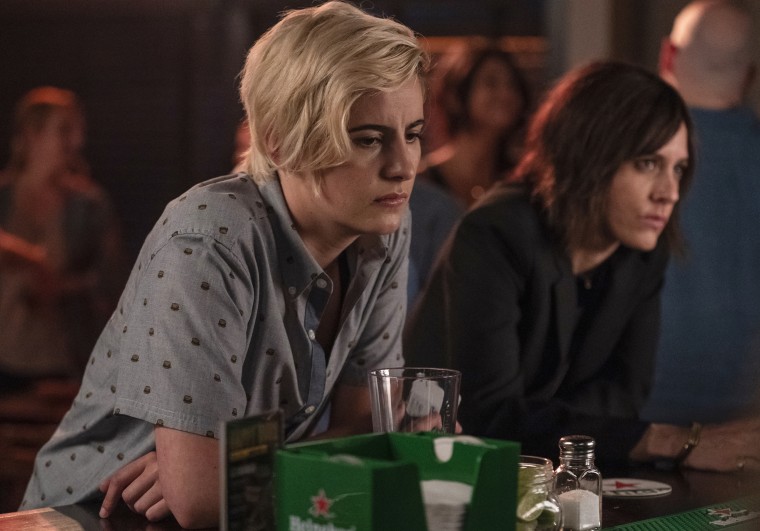For the actor Jacqueline Toboni, being on the set of “The L Word: Generation Q” alongside many of the actors she grew up admiring — and who, she said, gave her “permission to be an actress” — is the ultimate act of code-switching.
“Sometimes I definitely feel like we’re a family, but I’m still such a fan,” Toboni told NBC News. “I will ‘out’ myself as a fan, specifically to Leisha [Hailey] by accident all the time. I’m like ‘Well, you know, season 2, episode one, the radio show when Dana had just broken up with you’ … they just giggle at me.”
Toboni plays Sarah Finley, a fun-loving production assistant who works on a talk show hosted by Alice (Leisha Hailey), one of the stars of the original “L Word” series, which ran on Showtime from 2004-09. Finley is one of several new 20-something characters introduced on the reboot, which debuted this month. The original lesbian drama series has been described as “nothing less than revolutionary” for its time and was lauded for telling stories about lesbian life through a cast of predominantly LGBTQ characters. For many viewers, like Toboni, an out queer woman, the show marked the first time they had seen themselves represented on television.
“In high school, there was only one out girl in my class, and before I came out she got me a birthday gift,” Toboni recalled. “I opened it, and it was the season one box set of ‘The L Word,’ which was like $60 at the time, and she was just like, ‘Until you figure it out.’”
Toboni said she started “sneaking” and watching the show when her family wasn’t around and instantly became a “huge fan.” She gravitated toward the character of Shane (Kate Moennig), an androgynous hairdresser with a shaggy mane of her own.
“I had never seen someone like Shane, who’s not super femme, so for me I was like, ‘Oh, wow, there are other women — it’s not just this bombshell blonde that is in heels and a dress,’” Toboni said. “I didn’t feel like I fit that mold.”
“I think it was important for me to be like, ‘Oh, this is a show that I could potentially be on one day,’” Toboni added. “I legitimately thought that while watching ‘The L Word’ when I was younger, and I truly can’t believe this is how it worked out.”

While “The L Word” developed an immense fanbase, it also grappled with criticism. Some felt the show was solely concerned with the lives of white, cisgender, middle-class lesbians living in Los Angeles at the expense of telling stories that reflected the diversity of the queer community. Others were critical of the show’s ostensible erasure of transgender characters, especially trans women. The original series had one main trans character, Max (Daniela Sea), who had a tragic story arc that involved him being ostracized from and misgendered by his friends, becoming manic after taking testosterone and being abandoned by his boyfriend after conceiving a child he did not want. Even more upsetting for some viewers was the fact that Max, one of the first television portrayals of a trans man, was played by a cisgender woman.
“I think it’s hard to judge the original show by our times,” Toboni said. “All of a sudden we’re looking at this show that was on 10-15 years ago through the lens of what we now know and how society now works.”
“The L Word: Generation Q” may be interpreted as an attempt at atonement for some of the perceived missteps of the past. While fans of the original series will recognize some of their favorite characters, the reboot, developed by Marja Lewis-Ryan, is trying to be its own distinct project.
“Immediately the OG cast — Kate, Leisha and JB (Jennifer Beals) — sat us down and were like: ‘This is all of ours. This is a new thing. This is your show as much as it is our show,” Toboni said.
Most of the new cast members are people of color, and two transgender men are among the leads: Leo Sheng plays Micah Lee, a trans male adjunct professor, and Brian Michael Smith plays Pierce, Bette Porter’s trans male assistant. And while — much like the original series — the latest iteration is replete with steamy scenes, the show also concerns itself with today’s political landscape and occurs against the backdrop of the country’s opioid crisis. The series has Bette (Jennifer Beals) running for mayor of Los Angeles — a timely plotline in what has been deemed “the year of the lesbian mayor.”
“We're definitely trying to stay away from the coming-out stories and having every single character sort of saddled with the trials and tribulations of being queer, which happens when there's one queer character on a TV show,” Toboni said. “I think by doing this, it's definitely more representative of queer life.”
Though “Generation Q” relies on an ensemble cast, the show also takes the time to delve into the characters’ individual challenges. In the case of Finley, who is often positioned as the carefree butt of the joke, this means coming to terms with her religious upbringing and sexuality. In episode three, which premiered Sunday, Finley begins to confront her trauma with the Roman Catholic church through a new relationship with a pastor.
“I’ve never seen a grown woman deal with her queer identity and her religious upbringing and sort of having to reckon with that,” Toboni said. “Oftentimes you’ll see it though the conversion therapy lens, but in this story you see that shame is a living and breathing entity for her that she has to deal with.”
Toboni said she hopes people will watch “The L Word: Generation Q,” which premiered Dec. 8 on Showtime, and walk away with the same feelings she had secretly watching the earlier version of the show when she was younger.
“I want them to realize there’s a place for me, and there’s so many people ready to love and accept me,” Toboni said. “I think sometimes the world feels so small when you’re growing up and you’re queer, and sometimes it’s scary and you feel really alone.”



